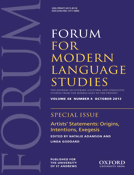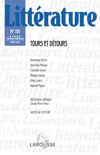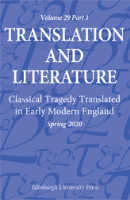
Acta Universitatis Lodziensis Folia Litteraria Romanica
metrics 2024
Championing Quality Research in Linguistics and Literature
Introduction
Acta Universitatis Lodziensis Folia Litteraria Romanica is a distinguished open-access journal published by LODZ UNIV PRESS since 2016, dedicated to advancing scholarship in the realms of Linguistics and Literature and Literary Theory. With a strong commitment to disseminating high-quality research, the journal serves as a vital platform for scholars and practitioners aiming to explore the complexities of language and literary studies. It is positioned within Q4 in Linguistics and Language and Q3 in Literature and Literary Theory, evidencing its growing influence in these fields. The journal's inclusion in the Scopus rankings, with notable placements in both the Arts and Humanities and Social Sciences categories, underscores its relevance and engagement with contemporary discourse. Located in Poland, the journal encourages contributions from a diverse range of voices and perspectives, promoting scholarly dialogue and innovation, while adhering to an open-access format for enhanced accessibility. Researchers, professionals, and students will find Acta Universitatis Lodziensis Folia Litteraria Romanica an invaluable resource for their academic pursuits.
Metrics 2024
 0.11
0.11 -
- -
- 1
1Metrics History
Rank 2024
Scopus
JCI (Web Of Science)
Quartile History
Similar Journals

REVISTA DE LITERATURA
Connecting scholars through cutting-edge literary research.REVISTA DE LITERATURA, published by the Consejo Superior de Investigaciones Científicas (CSIC) in Spain, stands as a beacon of scholarly excellence in the field of Literature and Literary Theory. With an impressive Q1 ranking in its category for 2023, the journal has established a reputable position within the academic community, reflected in its Scopus rank of #427 out of 1106, placing it in the top 61st percentile. Operating under an Open Access model since 2001, it ensures that cutting-edge research on literary texts, theories, and critical practices is freely accessible to all, fostering scholarly dialogue and enhancing the global discourse on literature. The journal’s continuous commitment to advancing literary scholarship from 1996 to 2024 highlights its role in addressing contemporary literary challenges while celebrating diverse voices and ideas. Researchers, professionals, and students alike are encouraged to engage with this vital resource, which not only showcases innovative research but also contributes significantly to the richness of literary studies.

GERMANISCH-ROMANISCHE MONATSSCHRIFT
Exploring the Intersections of Language and LiteratureGERMANISCH-ROMANISCHE MONATSSCHRIFT, published by UNIVERSITATSVERLAG C WINTER HEIDELBERG GMBH, is a vital academic journal dedicated to the fields of linguistics, literature, and literary theory. With its ISSN 0016-8904, this journal fosters scholarly discussions and disseminates innovative research that intersects Germanic and Romance languages and literatures. While it does not currently offer Open Access options, its contributions have positioned it within the Q4 quartile in both Linguistics and Language, and Literature and Literary Theory according to the 2023 category rankings. The journal's Scopus ranking reflects its emerging place within the academic community, situated at the 40th percentile for Literature and Literary Theory, and the 20th and 18th percentiles within Language and Linguistics, respectively. Scholars and students are encouraged to engage with this resource as it offers a platform for new perspectives that are pivotal to understanding the complex interrelations of these linguistic traditions, enriching both teaching and research initiatives.

Folia Linguistica et Litteraria
Bridging Disciplines: Where Language Meets LiteratureFolia Linguistica et Litteraria, published by the University of Montenegro's Institute of Language and Literature, is an esteemed academic journal that provides a vital platform for the exploration and discourse in the fields of Linguistics and Literary Theory. With an ISSN of 1800-8542, this journal serves as a significant resource for researchers, educators, and students alike, fostering an understanding of language, literature, and their interrelationship. Having established its presence in the scholarly community, Folia Linguistica et Litteraria has been ranked in the 2023 quartiles, achieving Q3 in Linguistics and Language, and Q2 in Literature and Literary Theory, indicating its growing influence and relevance. Its Scopus rankings further underscore the journal’s commitment to high-quality research, reflecting its standing within the arts and social sciences. While the journal operates without open access, its rigorous peer-review process ensures that only the most impactful studies are published. As it converges its focus from 2019 to 2024, this journal invites contributions that challenge conventional boundaries, encouraging interdisciplinary dialogue and innovative research in the rich fields of linguistics and literary studies.

FORUM FOR MODERN LANGUAGE STUDIES
Elevating Research in Literature and LinguisticsFORUM FOR MODERN LANGUAGE STUDIES is a prestigious academic journal published by Oxford University Press that has been serving the fields of literature and linguistics since its inception in 1965. This journal, with an ISSN of 0015-8518 and an E-ISSN of 1471-6860, plays a crucial role in advancing scholarly discourse on modern language studies, including literature and literary theory. With an impactful presence in both the linguistic and literary domains, it has been recognized in 2023 with a category ranking of Q2 in Literature and Literary Theory and Q3 in Linguistics and Language. It stands out in the competitive landscape, holding a notable position within Scopus rankings, including a 70th percentile ranking in Literature & Literary Theory. While the journal currently does not offer open access options, it remains a vital resource for researchers, educators, and students passionate about the transformative power of language and literature. Its commitment to quality research and robust academic discussion underscores its importance, making it a key platform for those aiming to contribute to modern language scholarship.

LEA-Lingue e Letterature d Oriente e d Occidente
Cultivating Critical Discourse Across Linguistic BoundariesLEA-Lingue e Letterature d Oriente e d Occidente is an esteemed academic journal published by FIRENZE UNIV PRESS that specializes in the multifaceted exploration of linguistics and literature across Eastern and Western traditions. With its ISSN 1824-4920 and E-ISSN 1824-484X, this Open Access journal has been committed to democratizing knowledge since 2012, allowing researchers, scholars, and students unfettered access to a wealth of scholarly articles and critical studies. Recognized in the Q4 tier for both Linguistics and Language and Literature and Literary Theory in the 2023 category quartiles, LEA strives to bridge cultural and linguistic boundaries while fostering a deeper understanding of literary theory. Operating from its base in Florence, Italy, the journal serves as a vibrant platform for innovative research and discourse, particularly for those dedicated to comparative studies and interdisciplinary approaches in the humanities. Despite its current rankings on Scopus, LEA is poised for growth and aims to enhance its impact in the academic community by publishing cutting-edge research that interrogates linguistic and literary intersections.

LITTERATURE
Bridging Scholarship and Society Through Literature.LITTERATURE is a distinguished academic journal published by LAROUSSE, dedicated to the exploration and critical discourse of literary studies. Based in France, this journal, with ISSN 0047-4800 and E-ISSN 1958-5926, serves as a vital platform for scholars, students, and professionals interested in both contemporary and historical literary theory. Despite its current categorization in the Q4 quartile of literature and literary theory for 2023, LITTERATURE aspires to elevate discussions within the field, providing a peer-reviewed environment for innovative research and theoretical exploration. The journal covers an extensive range of topics, including literary criticism, narrative theory, and cultural studies, ensuring it remains relevant in an evolving academic landscape. With an unwavering commitment to fostering scholarly communication, LITTERATURE invites contributions that challenge conventional perspectives and push the boundaries of literary analysis, aiming to bridge the gap between academic scholarship and broader societal narratives.

RLC-REVUE DE LITTERATURE COMPAREE
Cultivating Critical Perspectives in Comparative LiteratureRLC-REVUE DE LITTERATURE COMPAREE, published by DIDIER-ERUDITION, is a prominent French journal focused on comparative literature and literary theory, holding an ISSN of 0035-1466. Established in 2001, the journal aims to foster scholarly exchange and critical analysis in the field of literature, examining texts across cultures and disciplines. With its current categorization in the Q4 quartile for literature and literary theory as of 2023 and holding a Scopus rank of #880 out of 1106, RLC remains an accessible resource for researchers, professionals, and students alike. While it operates under a traditional access model, it continuously strives to contribute to the academic discourse within its scope, enhancing the understanding of literary complexities and intercultural exchanges. Based in the heart of Paris, at 6 RUE DE LA SORBONNE, the journal invites contributions that explore innovative perspectives and methodologies in literary studies through its ongoing commitment to scholarly excellence.

Revue Italienne d'Etudes Francaises
Fostering Scholarly Dialogue Across CulturesRevue Italienne d'Etudes Francaises, published by SEMINARIO FILOLOGIA FRANCESE, is a pivotal open access journal dedicated to the exploration and analysis of French studies within the broader context of history, linguistics, and literary theory. Since its inception in 2011, this journal has fostered scholarly dialogue and critical discourse, offering a platform for researchers, professionals, and students alike to disseminate their work and engage with contemporary issues in these fields. With an ISSN and E-ISSN of 2240-7456, the journal has established itself within the academic community, although it currently ranks in the lower quartiles across various disciplines, as indicated by its Scopus metrics. Nevertheless, the Revue Italienne d'Etudes Francaises remains an essential resource for those seeking to deepen their understanding of Francophone literature, culture, and linguistic dynamics from its base in Rome, Italy, at C/O Fondazione Primoli. As the field of French studies continues to evolve, this journal plays an important role in highlighting the latest research findings and theoretical advancements.

Materiali e Discussioni per l Analisi dei Testi Classici
Unveiling the Richness of Classical AnalysisMateriali e Discussioni per l'Analisi dei Testi Classici is a distinguished academic journal published by Fabrizio Serra Editore that focuses on the rich field of Classics and Literature, serving as a vital platform for scholarly discourse and research. Featuring ISSN 0392-6338 and E-ISSN 1724-1693, this journal has been actively publishing since 2009, with a dedicated effort to analyze classical texts and foster critical discussions among academics and students alike. Although the journal operates without an open access model, it is recognized for its significant contributions, evidenced by its ranking in the third quartile (Q3) in both the Classics and Literature categories as of 2023. This places it among the notable outlets for literary and classical scholarship, with Scopus ranks highlighting its ongoing influence in these fields. Based in the heart of Italy, in Pisa, the journal not only enriches the academic community but also provides an essential resource for those engaged in the profound study of classical literature, inviting contributions that challenge and expand current knowledge and methodologies.

Translation and Literature
Illuminating the Art of Translation in LiteratureTranslation and Literature is a leading academic journal published by Edinburgh University Press, focusing on the intricate relationship between language and literature within the realms of translation studies. With an ISSN of 0968-1361 and an E-ISSN of 1750-0214, this journal provides a crucial platform for scholars and practitioners to explore and disseminate research that addresses both the theoretical and practical aspects of translation. Since its inception in 1996, Translation and Literature has established itself as an essential resource, particularly noted for its contributions to the fields of linguistics and literary theory, as indicated by its Q4 ranking in both categories in 2023. The journal's articles are designed to foster dialogue across disciplines, encouraging innovative thinking and collaboration among researchers, professionals, and students alike. Access to this valuable resource is currently available through subscription, ensuring high-quality scholarship reaches a diverse audience dedicated to advancing the understanding of translation's role in literature.